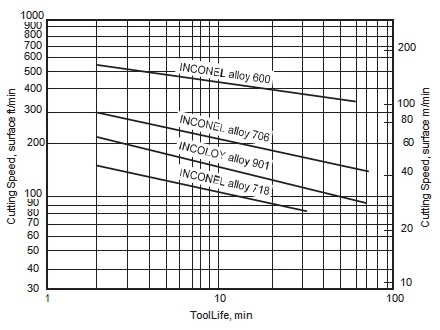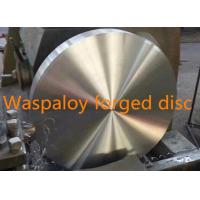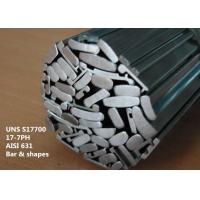High performance Alloy 706 (UNS N09706) semi-products for clean
energy and power generating
1 PRODUCT
High performance Alloy 706 (UNS N09706) semi-products for clean
energy and power generating.
Standard semi-product forms include sheet, strip, plate, round bar,
flat bar, forging, hexagon, ring, disc, wire and fastener etc.
2 EQUIVALENT DESIGNATION
GH4706, UNS N09706, INCONEL® ALLOY 706
3 APPLICATION
Alloy 706 is used for a variety of applications that require high
strength combined with ease of fabrication. In the aerospace field,
the alloy is used for turbine discs, shafts, and cases; diffuser
cases; compressor discs and shafts; engine mounts; and fasteners.
In addition to aerospace applications, the alloy is used for
turbine discs in large industrial gas turbines.
4 OVERVIEW
Alloy 706 is a precipitation-hardenable nickel-iron-chromium alloy
that provides high mechanical strength in combination with good
fabricability. The characteristics of the alloy are similar to
those of Alloy 718 except that alloy 706 is more readily
fabricated, particularly by machining.
The substantial nickel and chromium contents provide good
resistance to oxidation and corrosion. The primary
precipitation-hardening constituents of the alloy are niobium and
titanium. The aluminum content also contributes to the hardening
response.
The precipitation-hardening system in alloy 706 provides the
desirable characteristic of delayed hardening response during
exposure to precipitation temperatures. That characteristic gives
the alloy excellent resistance to postweld strain-age cracking.
5 CHEMICAL COMPOSITION (wt%):
Table 1 (wt%)
| Fe | Ni+Co | Co | Cr | Ti | B | Cu |
| Balance | 39.0-44.0 | ≤1.00 | 14.5-17.5 | 1.5-2.0 | ≤0.006 | ≤0.30 |
| C | Mn | Si | P | S | Nb+Ta | |
| ≤0.06 | ≤0.35 | ≤0.35 | ≤0.020 | ≤0.015 | 2.5-3.3 | |
6 PHYSICAL PROPERTIES
Density (Annealed):ρ=8.04 g/cm3 (0.291 lb/in3)
Density (Precipitation hardened):ρ=8.08 g/cm3 (0.292 lb/in3)
Melting temperature:1334-1371℃ (2434-2499°F)
Specific heat at 70°F (21°C): 0.106 Btu/lb•°F (444 J/kg•°C)
Permeability at 200 oersted (15.9kA/m)
Annealed
74°F (23°C) 1.011
-109°F (-78°C) 1.020
-320°F (-196°C) Magnetic
Precipitation-Hardened
74°F (23°C) 1.010
-109°F (-78°C) 1.040
-320°F (-196°C) Magnetic
7 METALLOGRAPHY
Alloy 706 is a precipitation-hardenable alloy with a
face-centered-cubic crystal structure. The alloy is strengthened by
the precipitation of a gamma prime or gamma double-prime phase
during heat treatment in the 1100-1400°F (595-760°C) temperature
range. Heat Treatment A produces both the gamma prime, which has a
face-centered-cubic structure, and the gamma double prime, which
has a body-centered-tetragonal structure. Heat Treatment B normally
produces only the gamma prime phase. The phases have a Ni3 (Nb, Ti,
Al) composition. They are not visible at magnifications achieved by
optical microscopy; electron microscopy is required for resolution.
Overaging or extended service at precipitation-hardening
temperatures results in a transformation of the phases to a
needle-shaped, orthorhombic Ni3Nb structure. That structure may be
visible with optical microscopy.
8 MECHANICAL PROPERTIES
The high-strength of precipitation-hardened alloy 706 is maintained
at temperatures up to 1300°F (705°C). Optimum mechanical properties
for the intended service temperature are achieved by the use of one
of two heat treatments.
Typical Room Temperature Tensile Properties of Hot Finished
Material
| Form | Size | Heat Treatment | Tensile Strength | Yield Strength (0.2% Offset) | Elongation | Reduction of Area |
| in | mm | ksi | MPa | ksi | MPa | % | % |
| Rod | 0.562 Dia. | 14.3 | A | 186 | 1282 | 144 | 993 | 19 | 28 |
| Rod | 8.0 Dia | 203 | A | 189 | 1303 | 146 | 1007 | 18 | 28 |
| Flat | 1.250 Thick | 31.8 | B | 193.5 | 1334 | 161.5 | 1114 | 20 | 38 |
| Rod | 0.562 Dia. | 14.3 | B | 193 | 1331 | 158 | 1089 | 21 | 55 |
9 CORROSION RESISTANCE
The composition of alloy 706 enables it to resist corrosion in
various environments. The alloy’s chromium content provides
resistance to oxidizing media, and its nickel content provides
resistance to reducing environments. Table 7-1 lists corrosion
rates for the alloy in several acid solutions at boiling
temperatures. Other tests have shown the alloy to have poor
resistance to boiling 50% sulfuric acid and to boiling 38% and
concentrated hydrochloric acid.
The nickel content of alloy 706 gives it resistance to both
chloride-ion and hydroxyl-ion stress-corrosion cracking. Stressed
specimens did not crack in 30 days of exposure to boiling 42%
magnesium chloride. A test in boiling 50% sodium hydroxide resulted
in a cracking time of 5 days.
Table 9-1 Corrosion Rates in Boiling Acid Solutions
| Solution | Material Condition | Corrosion Rate |
| mpya | mm/a |
| 10% H2SO4 | Annealed | 123 | 3.12 |
| 40% H3PO4 | Annealed | 55 | 1.4 |
| 70% HNO3 | Annealed | 14 | 0.356 |
| 70% HNO3 | Age Hardened | 60.6 | 1.54 |
| 25% HNO3 | Age Hardened | 1.7 | 0.043 |
a Mils penetration per year.
10 MICROSTRUCTURE
Alloy 706 is a precipitation-hardenable alloy with a
face-centered-cubic crystal structure. The alloy is strengthened by
the precipitation of a gamma prime or gamma double-prime phase
during heat treatment in the 1100-1400°F (595-760°C) temperature
range. Heat Treatment A produces both the gamma prime, which has a
face-centered-cubic structure, and the gamma double prime, which
has a body-centered-tetragonal structure. Heat Treatment B normally
produces only the gamma prime phase. The phases have a Ni3 (Nb, Ti,
Al) composition. They are not visible at magnifications achieved by
optical microscopy; electron microscopy is required for resolution.
Overaging or extended service at precipitation-hardening
temperatures results in a transformation of the phases to a
needle-shaped, orthorhombic Ni3Nb structure. That structure may be
visible with optical microscopy.
11 WORKING INSTRUCTION
Alloy 706 has good working characteristics and is readily
fabricated by conventional procedures for high- strength alloys. Of
particular significance are the machinability and weldability of
the alloy.
Hot forming
Alloy 706 has excellent hot formability at temperatures from 1600°F
(870°C) to 2100°F (1150°C). Test results indicate, however, that
optimum mechanical properties are obtained with hot-working
temperatures in the 1800°F (980°C) to 2100°F (1150°C) range.
Cold forming
Cold forming of alloy 706 is performed by standard methods for
high-nickel alloys. The work-hardening rate of the alloy is shown
in Figure 1. The cold-forming characteristics of alloy 706 are
similar to those of alloy 718. Alloy 706, however, is somewhat
softer in the annealed condition and requires lower forces for
deformation.

Figure 1 Effect of cold work on hardness of alloy 706 and other
materials.
Machining
Good machinability is one of the outstanding characteristics of
alloy 706. The superiority of alloy 706 over some other
high-strength alloys is shown by the tool- life/cutting-velocity
comparison in Figure 2.

Figure 2 Machinability of annealed material. Specimens were
machined with carbide tools and with water-soluble oil as coolant.
12 STANDARD SPECIFICATION
Rod, Bar, Wire, Forgings, and Forging
SAE AMS 5701
SAE AMS 5702
SAE AMS 5703 Bars, Forgings and Rings
Plate, Sheet, and Strip
SAE AMS 5605
SAE AMS 5606 Sheet, Strip and Plate
13 COMPETITIVE ADVANTAGE:
(1) More than 50 years experience of research and develop in high
temperature alloy, corrosion resistance alloy, precision alloy,
refractory alloy, rare metal and precious metal material and
products.
(2) 6 state key laboratories and calibration center.
(3) Patented technologies.
(4) Ultra-purity smelting process: VIM + IG-ESR + VAR
(5) Excellent high performance.
14 BUSINESS TERM
| Minimum Order Quantity | Negotiable |
| Price | Negotiable |
| Packaging Details | water prevent, seaworthy transport, mill’s export standard packing |
| Mark | As per order |
| Delivery Time | 60-90 days |
| Payment Terms | T/T, L/C at sight, D/P |
| Supply Ability | 300 metric tons per month |












